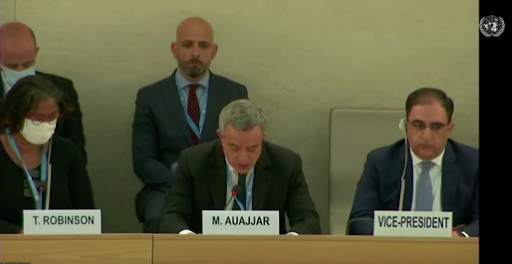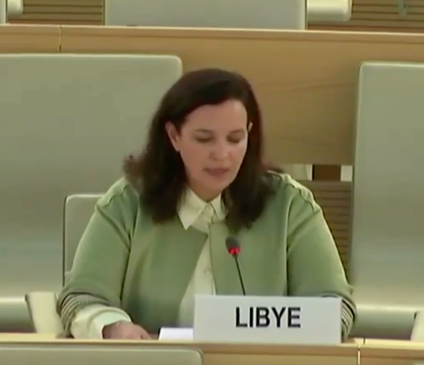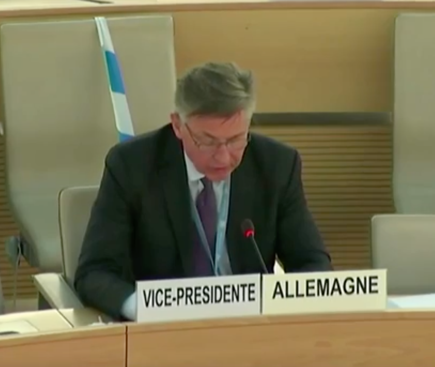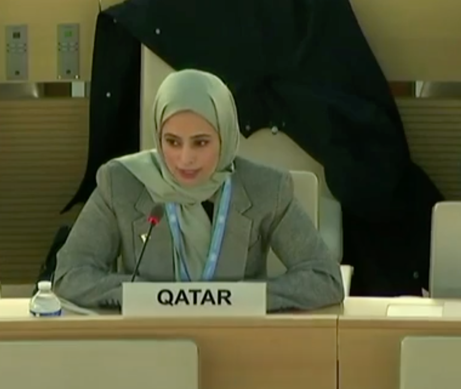49th Session of the Human Rights Council
28 February – 1 April 2022
Item 10: Interactive Dialogue with Fact-Finding Mission in Libya
30 March 2022
By Sivar Ahmed / GICJ
Executive summary
At the 52nd and 53rd meetings of the 49th Regular Session of the Human Rights Council held on 30 March, Mr Mohamed Auajjar, the Chair of the Fact-Finding Mission (FFM) in Libya, presented the follow-up report on the fact finding on human rights violations and abuses in Libya. The report focused mainly on ongoing investigations on human rights violations and abuses committed by different parties throughout Libya since 2016. The report is the follow-up of the October 2021 report, and the mission will submit its final report with recommendations in June 2022.
The interactive dialogue focused on Libya's continued human rights violations, including illegal detention, discrimination, arbitrary arrests, gender-based violence, and the narrowing of civic space. In addition, state delegates expressed their countries' support to the FFM to fulfill its mandate and showed willingness to provide necessary technical assistance to Libya. The state delegates and NGOs expressed their appreciation of the support provided by Libyan authorities to the FFM and voiced concern overthe ongoing violations and abuse of human rights under human rights law and international humanitarian law. Furthermore, they requested an extension for the mission’s mandate after June 2022.
Ms Tracy Robinson and Mr Chaloka Beyani (members of the FFM) responded to the questions posed by state representatives and NGOs. Their remarks reiterated that the mission continues to provide technical support to Libya and the international community was urged to support efforts to strengthen the rule of law.
Background
Based on the Libyan government’s request on 22 June 2020, the Human Rights Council adopted resolution 43/39, requesting the establishment and dispatch of fact-finding missions to Libya from the United Nations High Commissioner. Accordingly, the High Commissioner appointed Mohamed Auajjar, Tracy Robinson and Chaloka Beyani as the members of the Independent Fact-Finding Mission on Libya on 22 June 2020.
The mission’s mandate was to establish the facts and circumstances of the human rights situation in Libya since the beginning of 2016, to collect and review information, to document violations and abuses of international humanitarian law and international human rights law admitted by different parties throughout Libya, including gender-based violations. The mandate also intended to preserve evidence to ensure that perpetrators of such abuses will be held accountable.
The Mission’s first written report was presented to the Council in October 2021. The Mission’s work was extended to 30 June 2021 after the Council adopted resolution 48/25 on 13 October 2021. It required the Mission to present a follow-up report on both the forty-ninth and fiftieth sessions of the Council, including recommendations for follow-up.
Report of Fact-Finding Mission in Libya
Report A/HRC/49/4 on fact-finding in Libya mentions that the presidential framework that the House of Representatives issued between 9 September and 5 October 2021 increased political instability in Libya. As a result, the scheduled election on 24 Dec 2021 was postponed due to political and legal discord, resulting in a complete disregard for the rights to self-determination and public participation. In the shadow of a power struggle, armed groups continue to mobilise, and terrorist groups remain one of the largest threats in the country, especially in southern parts of Libya.
The report confirms the lack of staff that the mission experienced until mid-February. However, once key roles of the secretary were fulfilled, they made significant progress, including undertaking an increased number of assignments. Despite all the challenges, the mission completed its first visit to Benghazi, with a future visit planned for the Southern regions. The mission communicated with duty bearers and right holders during the reporting period and remain in continuous contact with victims throughout Libya, who ask for justice, accountability, democracy and the rule of law, and they ask for reconciliation.
As outlined in the report, peace in Libya can exist through Libyans themselves and with the support of the international community to build unified institutions. In order to facilitate better protection of human rights, Libya needs help to strengthen its judiciary and national institutions. A wide mandate has been given to the mission by the council to document the alleged violations and abuses of international human rights law and international humanitarian law committed by all parties in Libya since 2016. After submitting the first report in October 2021, the mission carried out investigations into the most serious violations of human rights focusing on infringements that hamper the transition to democracy and the rule of law. Such steps have great importance in preventing these crimes in Libya.
The report underscored findings relating to vulnerable groups. Furthermore, the Chair devoted special sections in the report to violations in the context of deprivation of liberty, sexual and gender-based violence extrajudicial killing and enforced disappearances. It also examined violations and abuses of migrants, women and minorities and further violations under international humanitarian law. The FFM’s report confirmed the existence of reasonable grounds to believe that some of the additional incidents identified, which involve detained victims during the armed conflict from 2019 to 2020, may constitute a war crime. In addition, the mission investigated several secret and illegal detention centres set up and controlled by armed militia that were previously closed but are reportedly still operating.
The follow-up report documented consistent patterns of serious human rights violations against migrants, refugees, and asylum seekers in Libya’s migration detention centres and trafficking hubs. The mission investigated the events involving the use of excessive force in early October 2021 against foreigners and migrants in detention centres controlled by Libya’s Department for Combating Illegal Migration, as well as investigating the abuses of migrants at the hands of traffickers.
The report also addresses the culture of impunity and how it is impeding the transition process in Libya, providing examples of violations compounded by the scheduled elections including the arrest and detention of individuals by armed groups. Impunity for attacks against women, civil society and human rights defenders was also examined in the report. The report calls on relative stakeholders to provide necessary technical support to Libya and arrange fields to fulfill its human rights obligations.
The ID with Fact finding mission on Libya
 Geneva, 30 March 2022- At the 52nd and 53rd meeting of the 49th regular session of the Human Rights Council, Mr Mohamed Auajjar, Chair of the fact-finding mission on Libya, presented the Mission’s second report on the human rights situation in Libya. He thanked parties that supported and cooperated with the mission to work in Libya, including the government of Libya, Tunisia, Egypt and Malta. In addition, he thanked the permanent mission of Libya and authorities in both Benghazi and Tripoli, for facilitating their entrance to the country and meeting authorities and civil society.
Geneva, 30 March 2022- At the 52nd and 53rd meeting of the 49th regular session of the Human Rights Council, Mr Mohamed Auajjar, Chair of the fact-finding mission on Libya, presented the Mission’s second report on the human rights situation in Libya. He thanked parties that supported and cooperated with the mission to work in Libya, including the government of Libya, Tunisia, Egypt and Malta. In addition, he thanked the permanent mission of Libya and authorities in both Benghazi and Tripoli, for facilitating their entrance to the country and meeting authorities and civil society.
The chair explained that the mission investigated violations that occurred over a period of more than six years, including new violations and abuses by state and non-state actors across Libya. In the mission’s first report, it was concluded that human rights violations and abuses were committed in Libya since 2016. Mr Auajjar stated that the mission will continue to document the violations against human rights and abuses that occurred in Libya and give special attention to the topic of impunity. However, further investigations are needed to comprehensively address the situation of human rights in Libya since 2016. Therefore, it was recommended that the Council extend the mission mandate once again. This extension will enable the mission to further monitor and document human rights violations and abuses and provide recommendations to help Libyan state institutions to end impunity, protect human rights, and contribute to the stability and reconciliation process.
 The delegate of Libya, Ms Hana Elgallal emphasised that the relevant national authorities had noted the outcome of the updated report of the FFM in Libya, and she thanked the Chair and mission members for their report. She affirmed the willingness of the Libyan authorities to promote and protect human rights in the country, and she stated that the Libyan government had submitted a request to the council to establish an independent committee to investigate human rights violations in the country two years ago. She further stated that they cooperated with the mission and facilitated their visits to Libya to fulfill their mandate. Additionally, Ms Elgallal emphasised the need for relevant Libyan authorities to combat forced disappearances and illegal detentions, as well as efforts to deal with illegal migrants and eliminate trafficking gangs. “My country has the right to regulate the entry and residence of foreigners on its territory, including the criminalisation of illegal infiltration and residence which is not a breaking of human rights and obligations,” said the delegate. She reiterated the necessity of encouraging and supporting Libyan dialogue on transitional justice, national reconciliation and to put an end to external intervention, as well as supporting political will to limit human rights violations in Libya.
The delegate of Libya, Ms Hana Elgallal emphasised that the relevant national authorities had noted the outcome of the updated report of the FFM in Libya, and she thanked the Chair and mission members for their report. She affirmed the willingness of the Libyan authorities to promote and protect human rights in the country, and she stated that the Libyan government had submitted a request to the council to establish an independent committee to investigate human rights violations in the country two years ago. She further stated that they cooperated with the mission and facilitated their visits to Libya to fulfill their mandate. Additionally, Ms Elgallal emphasised the need for relevant Libyan authorities to combat forced disappearances and illegal detentions, as well as efforts to deal with illegal migrants and eliminate trafficking gangs. “My country has the right to regulate the entry and residence of foreigners on its territory, including the criminalisation of illegal infiltration and residence which is not a breaking of human rights and obligations,” said the delegate. She reiterated the necessity of encouraging and supporting Libyan dialogue on transitional justice, national reconciliation and to put an end to external intervention, as well as supporting political will to limit human rights violations in Libya.
 The German delegate Mr Hans-Peter Jugel thanked the FFM for their report and shared his concerns regarding Libya's human rights situation. The delegate implored all parties to the conflict to commit to upholding international human rights. He condemned ongoing torture, intimidation, arbitrary detentions and gender-based violence in the country which is an issue that remains largely unaddressed. Mr Jugel emphasised Germany's support for the work of the FFM and the renewal of their mandate in June in the context of supporting efforts to end impunity and strengthen accountability. Furthermore, the delegate emphasised Germany’s support for long-term stability in Libya based on safeguarding human rights and the renunciation of violence. He concluded his statement with a question to the Chair, asking “how can the international community support Libya’s exercise in defending human rights?”
The German delegate Mr Hans-Peter Jugel thanked the FFM for their report and shared his concerns regarding Libya's human rights situation. The delegate implored all parties to the conflict to commit to upholding international human rights. He condemned ongoing torture, intimidation, arbitrary detentions and gender-based violence in the country which is an issue that remains largely unaddressed. Mr Jugel emphasised Germany's support for the work of the FFM and the renewal of their mandate in June in the context of supporting efforts to end impunity and strengthen accountability. Furthermore, the delegate emphasised Germany’s support for long-term stability in Libya based on safeguarding human rights and the renunciation of violence. He concluded his statement with a question to the Chair, asking “how can the international community support Libya’s exercise in defending human rights?”
 The delegate of Qatar, Ms Juhara Abdulaziz Al-Suwaidi, thanked the FFM for their efforts in implementing their mandate and emphasised her state’s support for all efforts aimed at peace, protection and the promotion of human rights in Libya. She condemned the continuous violations and abuses of human rights, targeting of civilians, arbitrary detention, and torture. Ms Al-Suwaidi called on warring parties to honor their commitments under international law and international conventions to ensure the protection of civilians. In addition, she urged the international community and OHCHR to continue providing technical support and capacity building regarding human rights and outlined the priorities set out by the Libyan government to help the government address the issue of illegal migration and human trafficking.
The delegate of Qatar, Ms Juhara Abdulaziz Al-Suwaidi, thanked the FFM for their efforts in implementing their mandate and emphasised her state’s support for all efforts aimed at peace, protection and the promotion of human rights in Libya. She condemned the continuous violations and abuses of human rights, targeting of civilians, arbitrary detention, and torture. Ms Al-Suwaidi called on warring parties to honor their commitments under international law and international conventions to ensure the protection of civilians. In addition, she urged the international community and OHCHR to continue providing technical support and capacity building regarding human rights and outlined the priorities set out by the Libyan government to help the government address the issue of illegal migration and human trafficking.
 The representative of China underscored that the conflict in Libya has a severe impact on regional and global security and stability. He stated that Libya's problem can be solved through political means however the use of a military solution was not appropriate. The representative urged the international community to support Libya’s internal political process. It was also emphasised that the UN should facilitate an environment for the promotion of peace. The delegate invited states to pay equal attention to political negotiations in counterterrorism to prevent terrorist and extremist forces from gaining ground in Libya.
The representative of China underscored that the conflict in Libya has a severe impact on regional and global security and stability. He stated that Libya's problem can be solved through political means however the use of a military solution was not appropriate. The representative urged the international community to support Libya’s internal political process. It was also emphasised that the UN should facilitate an environment for the promotion of peace. The delegate invited states to pay equal attention to political negotiations in counterterrorism to prevent terrorist and extremist forces from gaining ground in Libya.
Concluding remarks
In her concluding remarks, Ms Tracy Robinson thanked the support of the delegations for the work of the FFM and particularly the support of the permanent mission of Libya. She reiterated that the report is an intermediate report as it only reflects the mission’s ongoing investigations. Regarding the delegate's questions surrounding technical support, Ms Robinson explained that the level of violations and impunity is growing in Libya in the absence of institutions to respond in an appropriate manner and hold perpetrators accountable. It was elucidated that the FFM will continue to advocate for technical support as one of the key efforts of the mission.
Regarding the question posed on the narrowing of political participation in Libya, it was revealed that this had impacted the FFM’s access to witnesses and victims as well as the transition to democracy. Actions like detaining activists for exercising freedom of expression, increased hate speech campaigns against human rights defenders, and illegal presidential decreases to constrain civil society, contributed to narrowing civic space in Libya, which can be solved through "the immediate release of arbitrarily detained people for freedom of expression, the investigations of those who violated rights, and a review of legislation and regulations," emphasised by Ms Robinson.
In his response to the question, “how can the international community support the FFM?” Mr Chaloka Beyani clarified that the international community could support the FFM to fulfill its mandate and specifically in the goals of strengthening the law enforced institutions in Libya, strengthening the judiciary's independent, impartial and competent in the administration of justice, supporting independent accountability mechanisms specifically for international crimes both national judiciary mechanisms and international accountability mechanisms. He called for support for Libya in preparation for the election to ensure its free and fair conduct.
Position of Geneva International Centre for Justice
Geneva International Centre for Justice (GICJ) thanks the fact finding mission in Libya for their report. We support a democratic and peaceful transition in Libya and call for independent, free and fair elections to secure the democratic rights of the Libyan people. GICJ condemns all attempts by militia and political parties to interfere in the judiciary’s work. In addition, we call on Libyan authorities to end continued human rights violations, especially in the south part of Libya.
GICJ commends the efforts of the FFM to document and investigate violations and abuses of human rights under international humanitarian law in Libya. We support all efforts and the level of co-operation by NGOs with the FFM to make contact with victims and attempt to redress the human rights violations occurring in the country. We request the council extend the mission’s mandate after June 2022. Furthermore, GICJ urges the international community to support the FFM and Libyan authorities to strengthen the rule of law, build independent judicial institutions, end impunity, conduct free and fair elections, end ongoing interference, and maintain human rights structure in Libya. We share the concerns of the FFM regarding the situation of vulnerable groups in Libya, including women, minority groups and migrants. GICJ urges Libyan authorities to end gender-based violations and discrimination, provide more humanitarian aid for migrants and protect them from trafficking gangs. Furthermore, we ask the mission to conduct further investigations regarding illegal detention centres in Libya. Finally, GICJ urges the Libyan authorities to institute the necessary legislative developments in line with international standards to protect civilians, women, minorities and migrants.
49th session, Human Rights Council, human rights violation, Libya, war crime, violation, abuses, human trafficking, gender-based violence, militias, impunity, justice, international humanitarian law, geneva international centre for justice, gicj




